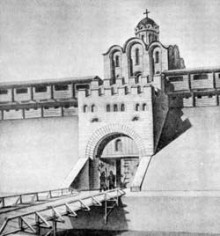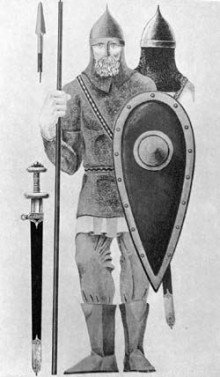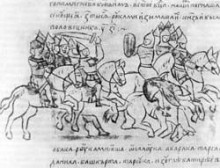(Conclusion. Continued from The Day, no. 151).
Could Rus’ have gone another way under these circumstances? It is possible. To a significant degree this depended on the personality of the Grand Prince, on his ability to compel the entire Riuryk dynasty to put the state’s interests first. One such opportunity coincided with the reigns of Volodymyr Monomakh and his son Mstyslav, which lasted for more than a quarter of a century.
An outstanding commander and statesman, Monomakh was one of a handful of leaders in Kyivan Rus’ who were in favor of resolving internal conflicts without the use of force. After the death of his father, Prince Vsevolod of Kyiv, Volodymyr, executing Yaroslav’s testament and wishing to avoid bloodshed, refused the throne in favor of his son Iziaslav Sviatopolk, even though the father surpassed the son in all respects. In fact, this most respected prince of Rus’ was practically Sviatopolk’s co-ruler. However, he agreed to become the Grand Prince only after Iziaslav’s death. Owing to the campaigns organized by Monomakh and Sviatopolk against the Polovtsians, the incursions of the steppe tribes into the Rus’ lands were halted, and this had a positive influence on its development. Volodymyr Monomakh’s course toward preserving the state’s stability and strengthening its security was continued by his son Mstyslav. As Vasili Tatishchev admitted, all the princes of Rus’ were living in peace at the time and did not dare offend each other. The note in the chronicle that Mstyslav exiled the princes of Polotsk and their families to Byzantium for declining to take part in a campaign against the Polovtsians is significant.
The successors of these prominent rulers no longer enjoyed the same authority or had an opportunity to gain it. In the absence of a strong ruler, numerous pretenders streamed to the Kyiv throne, and year after year the Kyivan Chronicle describes numerous internecine wars among the princes. The struggle was mainly between the Monomakhs and Olhovyches, although discord often erupted inside these milieus as well. In such cases, the princes often changed sides. Soon, a struggle between the supporters of the Monomakhs emerged between the Mstyslav branch on one side and Yurii Dolgoruky and his offspring — on the other. The Polovtsian hordes, who had been driven beyond the Don, Volga and Yaik rivers, resumed their devastations of the Slavic territories as the allies of one of the princes.
The growing fragmentation of the ancient Rus’ state was already endangering its existence. Thanks only to its vast territory, its significant human potential, as well as the absence of any worthy rival, the territory of Kyivan Rus’ did not become dependent on any of its neighbors. As a rule, its western neighbors supported one of the groupings. The steppe, divided into separate hordes, was situated east of the individual principalities of Rus’.
From time to time, the warring princes concluded agreements, made compromises, kissed the cross, and swore friendliness to each other. However, one side would violate the agreement at a favorable moment in order to strengthen its positions. The only exception was the joint rule of the older princes of the conflicting parties — Sviatoslav Vsevolodovych and Riuryk Rostyslavovych. These princes had already managed to occupy the Kyiv throne several times. They had understood from their own experience of the lengthy internecine wars that the victory of either of them might be a short- lived one, and only the enemies of Rus’ would profit from their struggle. They both wanted to see Rus’ a strong and prosperous state, but the only possible way out of the quagmire of internecine wars was through mutually advantageous compromises and steadfast adherence to their agreements.
Thus, Riuryk, taking into consideration that Sviatoslav was the oldest of them, “relinquished to him seniority and Kyiv, and took the entire Rus’ territory for himself.” It looked as though the compromise between them would also be short-lived. It seems as though the reign of Sviatoslav, who was already of a solid age, was not slated to bring anything new for Rus’. However, for the first time since the days of Askold and Dyr (if they had really ruled simultaneously) a duumvirate-the only acceptable form of government-appeared in Rus’, which was embroiled in internecine wars.
The chronicler calls both Sviatoslav and Riuryk Grand Princes. Their rule turned out to be the most long-lasting during the 12th century, and to a great extent this was determined by the princes’ personal friendly relations and their awareness of their common responsibility for the fate of Rus’. While at the helm, neither of the princes ever attempted to remove his co-ruler. On the contrary, they made all important decisions together, including joint actions against the Polovtsians, who had resumed their incursions into the weakened Rus’ lands.
While the main theme of the Kyivan Chronicle for nearly half a century was the discord among the princes, the chronicler does not record any conflict during the joint rule of the two princes. But almost every year lines similar to the following appeared in the pages of the chronicle: “Prince Sviatoslav Vsevolodovych, after taking counsel with his in-law Riuryk Rostyslavovych, marched against the Polovtsians”; “Sviatoslav and Riuryk guarded the Rus’ land near Kaniv the entire summer”. During this period Rus’ suffered only one defeat — in a campaign led by Prince Ihor Sviatoslavovych against the Polovtsians.
However, relations between the princes were not always cordial. In 1188 they went through the test of Halych. After the death of Yaroslav Osmomysl, the Halych land was engulfed by disturbances, and Sviatoslav and Riuryk set out to capture the throne of Halych. However, Sviatoslav wanted to give Halych to Riuryk and seize the entire Rus’ territory, while Riuryk, as the chronicler notes, did not want to lose the Rus’ land. Failing to come to an agreement, they decided it would be better to return. Unfortunately, the ruling stratum of Kyivan Rus’ turned out to be unprepared to accept the form of government suggested by Sviatoslav and Riuryk, and the joint rule of the two representatives of the two conflicting sides remained the exception, an unfulfilled alternative to the state’s downfall.
After the death of Sviatoslav Vsevolodovych, the struggle for the “gold-forged Kyivan throne” resumed with renewed intensity. The period before the arrival of a new, formidable enemy — the Mongol- Tatars — on the eastern borders of Kyivan Rus’ was especially unfavorable. Suffice it to say that between 1201 and 1212 the princes on the Kyivan throne changed 15 times; no additional commentaries are necessary. From 1235 to 1240, nine princes occupied the throne. On the eve of the Mongol siege, for the first time since the days of Kyi the city that he founded was without a prince.
In these circumstances the Rus’ lands inched toward the tragic period of 1237-1240, when marching against them were not the separate hordes of the Polovtsians but hundreds of thousands of well-organized and invincible troops of Baty-Khan. The princes of the house of Riuryk could not be unaware of this. However, the Grand Prince of the house of Volodymyr, Yurii Vsevolodovych, refused to help Prince Yurii Ingvarevych of Riazan, thus signing Yurii’s death warrant and his own.
Retribution for Yurii’s self-confidence was not long in coming: his attempts to raise an army ended with the defeat of the Rus’ army, caused by the refusal of his brother, Prince Yaroslav of Suzdal, to join his army. Despite the menacing news coming from the eastern borders, he went south to lay claim to the Kyivan throne. The chronicles do not even hint at any attempts by the princes of the southwestern lands to organize any resistance to the conquerors. Left alone to face the pitiless enemy were Pereiaslav (Russian) and Chernihiv, although the possibilities for organizing a joint resistance were not yet lost. Even the fall of these ancient cities did not stop the princes from settling their accounts. The fate of Kyivan Rus’ was determined.









